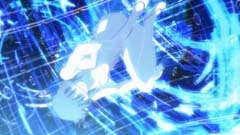Behind the Scenes Part 7: Yoko Kanno (Music Composer) II
The music for Ghost in the Shell: Stand Alone Complex is like jewelry sprinkled all over, glittering in an assortment of colors. In this second part of our interview with Yoko Kanno, the composer tells us about the creative process behind the music of Solid State Society .
Part 7: Yoko Kanno (Music Composer) II
"I could say that I'm driven by a sensitive world that precedes words as a form of expression."
 | Profile Born on March 18, in Miyagi Prefecture, Yoko Kanno is a music composer, arranger and pianist. She has written and performed music for many commercial films, TV dramas, feature films, animation and video games, and is currently one of the most world-renowned of Japanese musicians. She wrote the score for famous animated works, including Macross Plus, Cowboy Bebop, Vision of Escaflowne and Wolf's Rain, and is the most trusted composer by veteran and new-wave directors such as Yoshiyuki Tomino, Shinichiro Watanabe and Shoji Kawamori.. |
For Solid State Society, where did you get the ideas for your scores?
The script was so exciting. I in fact devoured it in a sitting. For a TV series, we usually compose music ahead of time, but for this particular project, I really wanted to synchronize the scores with the scenes to share this ingenious world with the audience. I actually did match the scores with many of the scenes. In Solid State Society, individual parts had separate identities. This was an underlying theme on the personal level. It's difficult to explain. I'll give you an example. Motoko, if I put it in catchy words, had her divided identity dwelling in different parts of her body. It was like she had her "self" here as well as another "self" over there, I think. Two years had passed since S.A.C. 2nd Gig, and she can now integrate or disintegrate her body parts of her own free will. This was how she came about to be. That was my assumption. My personal objective was to illustrate her progress, flexibility and strength in my music.

Did you read the script and the storyboards really thoroughly before working on the scores?
It wasn't necessarily a "thorough reading," in terms of what it literally means. I would quickly read the script. Maybe in twenty minutes to get that valuable first impression. Then I put it aside and compose the score with the holistic image of the story.
I usually look at the storyboards too, but frankly speaking, I am not very good at deciphering them. I seldom read manga, so I don't know how to shift the pictures in my head. I rather design with the images I get from reading printed material.
Solid State Society deals with complex and realistic social issues. What were your thoughts?
I don't know what to say. (lol) If I take them seriously as social issues, I can't make music that really explodes. What interested me was not really the theme, but the flow of things; how they told the story. It might be that it is not the language or the words that compel me to compose. I could say that I'm driven by a sensitive world that precedes words as a form of expression.
You compose based on your impressions of images from the anime?
Well, you see, I think music is closer to emotions. When I say that it precedes words, I mean closer to pure emotiveness. For example, I feel I compose music to express my feelings that arise from seeing the everyday world around me. Vague and raw feelings which are not clear enough to be put into words. To give you a more specific example, the primitive and unresolved feelings such as "This person interests me," "I don't like that person, but I can't ignore him/her," "I want to go, but I don't want to leave," or "It will be dangerous, but it will be fine." You know what I mean? I think I am fascinated with expressing feelings that can't be expressed well with words.
Is it easier to put them into musical notes than words?
Yes, I would say that. A violin's tone can sound scary or powerful with a tiny variance in how the instrument is played. A slight vibration of a note can deliver a minute nuance that you can't express with words.
(2 - to be continued)
Originally published in Japanese on clappa!
http://clappa.jp
© 2002-2006 Shirow Masamune - Production I.G/KODANSHA

![WORK LIST[DETAILS]](/contents/works/design/images/left_title.gif)



 terms of use
terms of use